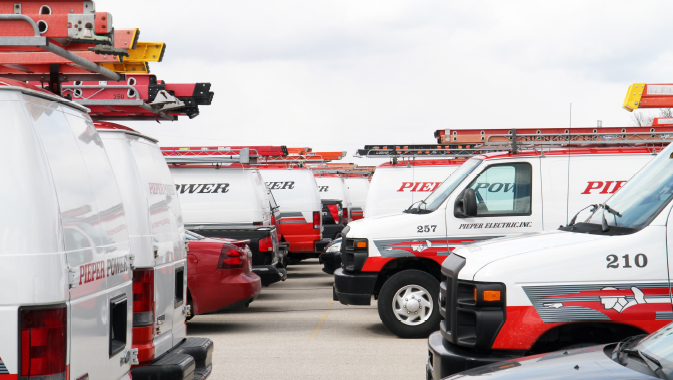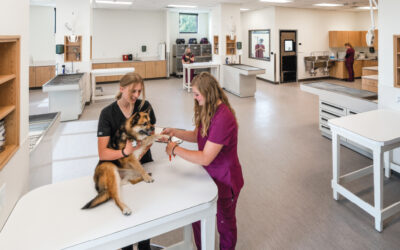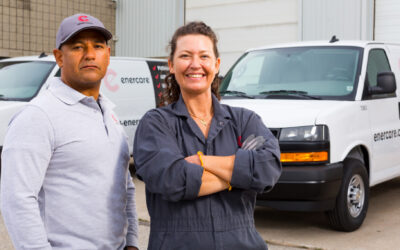Pieper Electric is a full-service electrical contractor headquartered in southeast Wisconsin with multiple locations throughout Wisconsin. Pieper employs over one thousand workers and has a very low attrition rate which is no doubt thanks to its six guiding values: Servant’s Heart, Integrity, Humility, Wisdom, Courage, and Passion.
~
In 1960, Dick Pieper acquired ownership of Pieper Electric from his father Julius Pieper who had founded the company thirteen years prior. At that time, the company employed three electricians. Over the next decade, Pieper expanded the business to include branches in eight states. In 1990, as Pieper began planning for his eventual retirement from his position with Pieper Electric, he set out to ensuring that the future of the company would be guided by ethical behavior, progressive practices, and growth for their people.
In 2001 employees became majority owners of the company. As owners, Pieper’s employees are invested in the success of the business. They are the very people who know the company best and believe in it the most.
Pieper Electric is equipped to handle jobs of all sizes ranging from the installation of an outlet in a residence all the way up to large-scale installations such as hospitals and water treatment plants. “You name it electrically, we probably do it,” says Todd Cook, company safety manager.
The company provides electrical contracting to a variety of industries with an emphasis on public municipalities such as the federal building in downtown Milwaukee. It specializes in water and wastewater treatment plants and has completed projects on plants throughout Wisconsin, Illinois, and Ohio.
Other markets include healthcare systems, and it has completed electrical work at Columbia-St. Mary’s, Aurora-St. Luke’s, St. Catherine’s Hospital, the Children’s Hospital of Wisconsin-Milwaukee and many others.
In the late 1990s Pieper completed the electrical work at Miller Park, home of the Major League Baseball team, the Milwaukee Brewers.
Pieper’s commitment to its employees and customers is most obvious in its commitment to safety. Safety is its number one priority, and that it shows through every aspect of the business. The company is proud to say that it has led over one thousand of its employees through OSHA’s thirty-hour safety training certification program. In fact, it goes one step further; it offers what it calls a 30/22 safety training course, with requirements beyond the thirty-hour course from OSHA, and it offers this to all employees.
The instructors for the course are volunteer OSHA-authorized employees, and all staff complete the course on a volunteer basis, outside of work hours. The employees have a thirst for learning and improving, “We are constantly re-educating our employees on best practices,” says Cook. “The culture at Pieper is really a learning culture.” Employees want to do their best and strive to improve their skills to become better craftsmen.
Pieper makes it a point to support and push for that culture of continuous learning and improvement not only through its safety and skills training courses, but also by promoting transparency, internal support, and openness. Employees at levels from apprentices to journeymen and supervisory staff are encouraged to speak up at any time if they are unclear on the task at hand, or if they feel as though something is unsafe. Speaking up on the job site is always met with a supportive and positive reaction.
The company encourages its employees to have an open culture, to voice both concerns and suggestions to make processes better and to drive out waste, danger, and inefficiencies. It believes that there is no one better to suggest process and safety improvement than its own employees who are on the job sites each and every day. It is always striving to be better, safer, more efficient and more productive.
There is no better example of this culture of openness and safety than the accomplishment of having a zero lost time injury record for the last three years, currently operating at over 5.5 million hours between lost time injuries. Pieper Electric has had a record low rate of even minor first aid cases. Its TRIR (Total Recordable Incident rate) rates provide both its employees and its customers with the security and confidence that they run a safe and efficient operation. This is thanks in part to the fact that the company focuses on pre-planning its tasks, that its employees have a strong understanding of protocols, and that it has the very best protective equipment for employees. Pieper currently has a TRIR rate of “0” in 2017.
In today’s society young people are often pushed away from the traditional skilled trades and instead encouraged to go into academic and STEM fields (science, technology, engineering, mathematics). One of the biggest challenges for Pieper and for other businesses that depend so heavily on skilled trades is the shortage of available manpower that is the result of this push. There are simply too many projects and too few apprentices, journeymen, and supervisors.
“More and more younger folks gravitate toward technology-driven jobs. There’s not a lot of folks coming out of school seeking some of those hands-on crafts jobs,” says Cook. Pieper is actively working to counteract this and is active in local communities raising awareness about the merits of having a trade certificate by speaking at high schools, colleges, and other community programs. These endeavors have been successful in reaching interested and engaged young people and educating them on a path forward.
Pieper is not just focusing on acquiring external talent, but has also developed an internal program to help workers on the job sites develop into supervisors. Supervisory positions require a different skillset than those used on a job site as an electrical worker, and the company is committed to helping those who have expressed a desire to move up; it has created an environment that supports career advancement to retain and nurture top talent.
Pieper Electric is a company that prides itself on its continuous improvement culture with an emphasis on safety. It not only looks to developing its own safety practices and protocols, but it also looks to other contractors, and if it sees a better technique, it is quick to learn from that company and adopt technologies and practices that will help keep it agile and competitive.
The company is also engaged in charitable endeavors. The PPC Foundation is a charitable organization that exists to give back to the communities in which it operates. The company distributes ten percent of the annual pre-tax earnings to non-profits recommended by employees and the community. The people at Pieper believe that service makes them broader, deeper, more compassionate and understanding.
Pieper Electric has an unwavering commitment to a set of core values that are reflected in every facet of the way it operates. These principles shape not only the business practices but the general values of the company’s people. “We operate with a servant’s heart, focusing on the needs of others.” explains Cook. “With integrity, we’re honest and trustworthy. With humility, being modest and respectful of what we do. With wisdom, we’re insightful in the way we approach work. We act with courage, so we’re decisive in what we do, and we have confidence in others, in particular those coming up through the ranks, and we have passion that really shows our dedication to the craft and our people. Those values are what guide us.”













